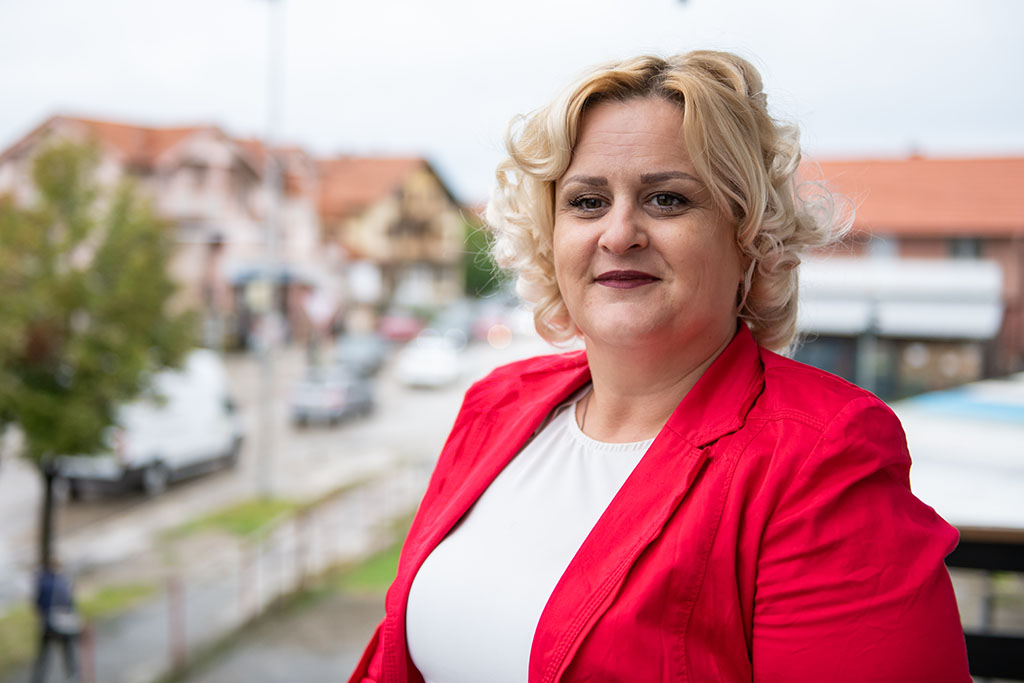The power of resilience: Rebuilding life after domestic abuse
Economic dependence, disability, and fear of losing her children: Leaving her abusive husband of ten years was all but an easy decision for Milijana Krsmanović. After seeking support from a local women’s rights organisation, she found the strength to reclaim her life and independence.

When Milijana Krsmanović first decided to seek support from a local women’s rights organisation, she was looking to get away from her abuser. She needed to escape the psychological and physical violence her husband of more than a decade had been subjecting her to for years.
”I fled my home together with my kids, my two sons and daughter. They were eleven, eight, and three and a half years old at the time,” Milijana recalls.
After leaving her home and speaking to a friend, she was recommended to seek support from Lara Foundation—one of The Kvinna till Kvinna Foundation’s partner organisations based in Bijeljina, Bosnia and Herzegovina. Founded in the aftermath of the war, the organisation has been supporting women’s rights since 1998. They focus on protecting women from gender-based violence, empowering women in public and political work and fighting human trafficking. Here, Milijana received psychological and legal support, and was able to connect with other women in similar situations.
“I came here very scared. I wasn’t too scared about being beaten by my husband again, but of my children possibly being taken away from me, in particular, because I’m a person with disability,” says Miljana, who is fully blind.
Losing her eyesight
Milijana was only nineteen years old when she and her now ex-husband got married.
“We met in a café,” she says and laughs.
Born in Sarajevo, Milijana had moved to Bijeljina—a city located in the northeast of the country—after the war in 1996.
“There was a big migration [wave] caused by war. So, this is how I ended up being here. And this is where I completed my school. And this is where I met my husband,” she says.
Almost ten years into her marriage, at the age of 29, Milijana began losing her eyesight. Around the same time her eyesight worsened was when the violence started. Initially, Milijana found herself wondering whether it was her disability that caused her husband to abuse her—that the loss of her eyesight was affecting her marriage, thinking it was her fault.
“I kind of felt that maybe that was the cause of the problem; what triggered the violence,” says Milijana.
It was only after she had sought help at Lara Foundation and heard stories from women who, like her, had experienced violence, that she realized her disability had nothing to do with it.
”I realised that all of this would have happened to me even if I wasn’t blind. The perpetrator of violence is a perpetrator of violence, irrespective of the circumstance,” says Milijana.
Fighting for her children
Her disability presented a major barrier for Milijana to leave her husband despite the abuse she had been forced to endure. She was not only financially dependent on him, but also felt like her visual impairment had prevented her from acquiring the qualifications needed to find work to support herself. On top of that, she feared for her children being taken away from her and having to stay with her abuser.
Nevertheless, when the violence continued to worsen, Milijana made the difficult decision to leave.
At Lara Foundation, she received psychological support through regular counselling sessions, as well as legal and economic support. This support helped Milijana find the strength to not only divorce her husband, but also fight for custody of her children.
“When I came to Lara, I felt very much calmed down and consolidated. In a way, I became more courageous because they were very supportive and encouraging” says Milijana.
Today, Milijana has full custody of her children. Through her work as a physiotherapist, she has been able to support them and herself:
“I have graduated from a special school for persons with visual impairment and completed the course for a physiotherapist. So, I got a job as physiotherapist at a hospital, and I also provide massage services,” says Milijana.
Not only that—but after years of being financially dependent on her husband and not knowing whether leaving him would mean not having a roof over her head, Milijana was able to buy her own home.
“I bought an apartment which is now hundred percent mine. And no one can ever really, you know, move me out of it,” she says.
“I’ve learned to look after myself”
Today, almost ten years after gathering all her courage to seek help and leave her abuser, Milijana feels she is in a good place; a place where she no longer needs psychological support. She has stopped attending the counselling sessions offered by Lara Foundation.
“I’ve learned how to look after myself,” says Milijana.
By telling her story, Milijana hopes to encourage other women to leave abusive relationships:
“If I, someone who is 100% visually impaired, was able to leave a violent environment and find my own way, then I believe anyone else can also do it.”